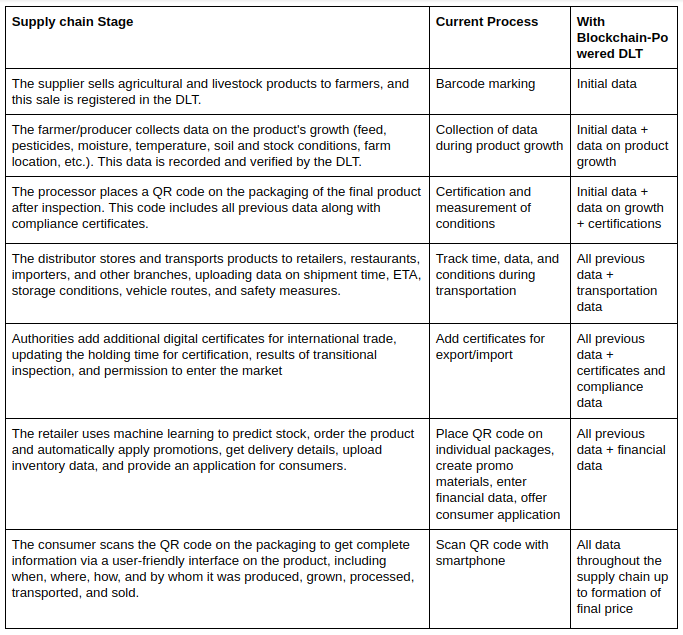-
Food is essential to life. We often don't understand is that food that provides us nourishment can be detrimental to our health and the environment. Foodborne disease costs in the United States alone range from $55 billion to $93 billion. Besides, one-third of food produced for human consumption is lost or wasted globally. Now, organizations are exploring ways to upgrade the system with blockchain food supply chain development.
Complex Food Supply Chain
Our food supply chain is complicated due to manual, paper-based procedures, burdensome administrative functions, expanding regulatory standards (such as the Food Safety Modernization Act), and more. Besides, doubling penalties for infringements and lack of visibility in food safety certificates and audit reports are some of the concerning issues affecting food supply chains globally. Simply delivering food from a grower to a customer table requires several intermediaries: food manufacturers, producers, distributors, dealers, logistics, and regulators. Data exchange in this environment is typically limited to individuals with direct communication, and no one has complete, end-to-end transparency of the supply chain.
Although our existing food supply chains work, information is often incomplete, comes from multiple sources, and is available in different formats.
Once an apple or pork chop makes it to your dining table, you have no way of confirming its genesis or manufacturing process assertions like "organic" and "non-GMO." People also have to presume that food is not adulterated because food recalls are often not issued promptly.
And if there's a recall, you'll likely end up throwing out unaffected food along with tainted food. These issues call on consumers to improve transparency in the food supply chain processes. They want to know where their food comes from and how it is grown, harvested and transported. That's a big order to fill up, but blockchain might help.
Blockchain to the Rescue
Blockchain can provide end-to-end traceability if the entire supply chain ecosystem shares a single, tamper-resistant ledger of information that can only be updated by consensus. Participants may access their portion of the same information in an authenticated, trustworthy, and scalable network.
Since October 2016, IBM and Walmart have been collaborating on a pilot project to demonstrate the effects of tracing food products on the blockchain. During the annual shareholders meeting, it was announced that the original experiment had produced "promising" results.
Frank Yiannas, VP of Food Safety for Walmart, revealed how he was able to find out how to track information using blockchain in 2.2 seconds. A process that spanned almost seven days using previous methods. It will assist to reduce the response time when contaminated food is discovered and make selective recall possible.
Not only can traceability enabled by blockchain boost consumer safety; it can also help to reduce fraud in the industry.
Also, Read | Strengthening Food Supply Chain with Blockchain Amid COVID-19
Food Supply Chain Management with Blockchain | Benefits
Food companies can use the blockchain to instill transparency in their supply chain processes. Blockchain has the potential to add an extra layer of safety to the food industry.
Transparency
Since the data collected at every stage is open to all inside the network, blockchain will help add accountability to the supply chain. From the production to the sale of a food item, everything can be recorded on the blockchain to get rid of any food fraud or food recalls.
Efficiency
Blockchain can improve the way food is tracked, transported, or sold. By keeping every digital record of the transaction, blockchain could overcome the inaccuracies caused by traditional paper-based records. In the event of any food recall or investigation, the process could be carried out seamlessly as blockchain offers end-to-end traceability.
Secure and quick transactions
For blockchain, the information can be exchanged in a matter of minutes. Once the data has been validated, it is replicated on different networks to ensure its security.
Food safety
Blockchain could bring significant progress in food safety by saving lives and cutting costs. Since permanent information records are maintained on the blockchain, there are fewer chances of incidents of contamination.
Food Supply Chain Management with Blockchain | A Process Prototype

Also, Read | Blockchain Solutions in the Food Industry | Exploring Potential Use Cases
Conclusion
Adopting blockchain can be a revolutionary solution for food supply chains. They can have greater clarity on an otherwise opaque path from harvest to sale. All parties along the chain, however, need to follow the steps and embrace technological change. With global retail giants like Walmart and Carrefour leading the way, we can see supply chain players jumping on the bandwagon.
Do you want to improve the traceability of products and the transparency of the supply chain for your agribusiness? Contact the experts of Oodles. We're going to help you come up with the best technical solution for your specific needs.

Our Offices
INDIA
Emaar Digital Greens, Sector 61,
Gurugram, Haryana
122011.
Welldone Tech Park,
Sector 48, Sohna road,
Gurugram, Haryana
122018.













